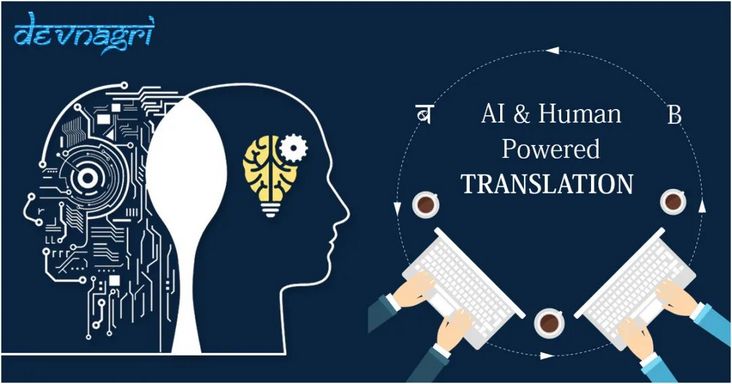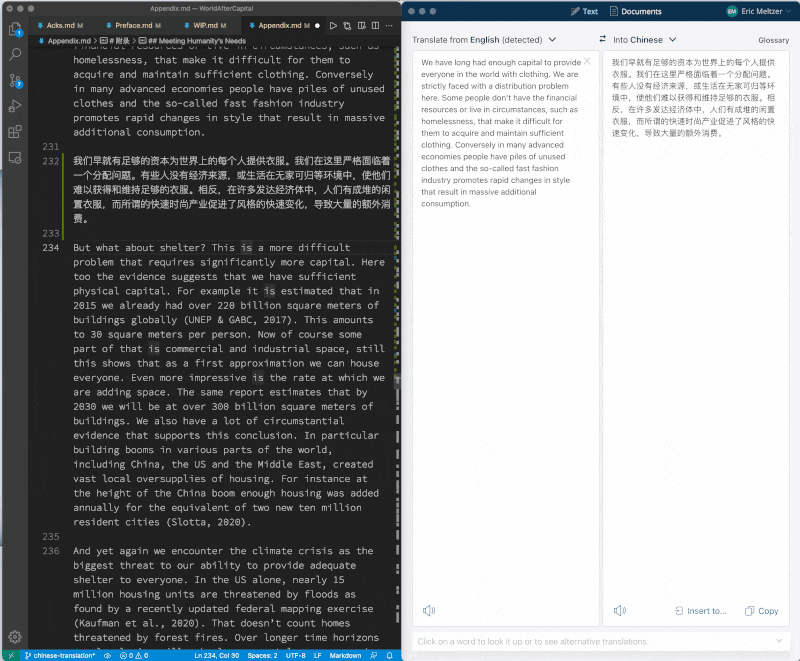Original text: Li Xiaolai @ study and study again

It only takes one day to translate a book!
——This is what I did today.
At the beginning of this month, I explored the Google Cloud Translation API for a while. In the process, I found DeepL and directly turned around. I bought the Pro service for less than $24 a month and less than $300 a year... It's ridiculously cheap.
Deep l machine translation can translate any language to any language with amazing speed and accuracy - I don't want to use exclamation marks here
so what?
Then, translation basically becomes a "relatively low-level text editing work". Most of the keyboard strokes are for the following things:
- Single and double straight quotation marks shall be converted into quotation marks suitable for Chinese typesetting, "," and ";
- A dash formed by two minus signs -- replace it with a unicode dash with appropriate spaces before and after --;
- There should be a space between English and numbers and Chinese, for example, in 2021;
- The titles of books, magazines and articles should be replaced with;
- Avoid using italics for Chinese characters and replace them with emphasis
- The between surname and first name of a person's first name should be replaced by ·;
- The ellipsis should also be changed
If the original English writing style is really in line with Plain English and doesn't play literary talent, then the translation of deep l can be almost perfect.
I have a special feeling about this when I used to be a writing teacher. The literary grace of dancing and writing often reduces the dissemination of effective knowledge. Therefore, I have developed my own "vernacular style", try not to use unnecessary idioms, and try not to use rhetoric other than analogy (analogy is almost the only rhetorical means that can cross language and cross culture)
In a few cases, it should be noted that:
- The translation of specific concepts and their unification in the previous and subsequent texts. For example_ Collective Fitness_, The translation of "common health" is obviously not in line with the context and should be "collective adaptation";
In a few cases, some phrases may be omitted by smart translation. For example,
When St. Elizabeth of Hungary was lying in state, "a crowd of worshippers came and cut or tore strips of the linen enveloping her face; they cut off the hair, the nails, even the nipples."
When St. Elizabeth of Hungary lay in bed, "a group of admirers came here to cut or tear off the linen strips wrapped around her face; they cut off their hair, nails and even nipples."
In this sentence was lying in state_, It refers to "the body is seen by the public". Therefore, it needs to be adjusted:
When the body of St. Eliza in Hungary was seen by the public, "a group of worshippers came here and cut or tore off the linen strips wrapped around her face; they cut off their hair, nails and even nipples."
Sometimes, I can't help but want to add some notes, such as:
"Death from above" from the 1979 film "doomsday"( The Apocalypse Now , the film was translated into modern Apocalypse in Chinese - I guess the Title Translator interpreted the word Apocalypse in a religious sense...). In the film, Colonel Bill's helicopter is painted with this slogan. In addition, the Latin version of this slogan: Mors Ab Alto was also written on the fuselage of the 7th bomb wing of the US air force at the end of World War II. From the perspective of context, the word "death from above" should refer to modern war.
- In only a few cases, there will be problems in the translation of the whole sentence. At this time, you only need to change it easily. However, "discovering this kind of sentence" requires the ability to "be in a state of intensive reading all the time", which seems to have little to do with the ability of translation.
The above trivial and boring (very large) or even troublesome and interesting detail work (very small amount) is completely effortless, first because the tools are too convenient, and second because intensive reading is not fast; However, in fact, the more critical driving force is my own "text format control" from my own experience
Although I often bring typos when I write my own articles (I blame Pinyin input method rather than my carelessness), I just can't stand the ugly display of a text on the computer. In this regard, I am an extremely OCD patient. Anyway, I must find a way to make the typesetting extremely comfortable!
Therefore, this has become an unexpected driving force, which makes me have another important reason to focus on my already strong intensive reading ability - I don't feel tired at all anyway.
I set many shortcut keys for VSCode so that I can "get the most out of it" when editing text:
[
{
"key": "ctrl+shift+9",
"command": "editor.action.insertSnippet",
"args": {"snippet": "($TM_SELECTED_TEXT$0)"},
"when": "editorTextFocus&&editorHasSelection"
},
{
"key": "ctrl+shift+'",
"command": "editor.action.insertSnippet",
"args": {"snippet": ""$TM_SELECTED_TEXT$0""},
"when": "editorTextFocus&&editorHasSelection"
},
{
"key": "ctrl+'",
"command": "editor.action.insertSnippet",
"args": {"snippet": "'$TM_SELECTED_TEXT$0'"},
"when": "editorTextFocus&&editorHasSelection"
},
{
"key": "ctrl+shift+[Backslash]",
"command": "editor.action.insertSnippet",
"args": {"snippet": "[$TM_SELECTED_TEXT$0]"},
"when": "editorTextFocus&&editorHasSelection"
},
{
"key": "ctrl+shift+[Slash]",
"command": "editor.action.insertSnippet",
"args": {"snippet": "<$TM_SELECTED_TEXT$0>"},
"when": "editorTextFocus&&editorHasSelection"
},
{
"key": "ctrl+shift+[BracketRight]",
"command": "editor.action.insertSnippet",
"args": {"snippet": "「$TM_SELECTED_TEXT$0」"},
"when": "editorTextFocus&&editorHasSelection"
},
{
"key": "ctrl+shift+[BracketLeft]",
"command": "editor.action.insertSnippet",
"args": {"snippet": "『$TM_SELECTED_TEXT$0』"},
"when": "editorTextFocus&&editorHasSelection"
}
,{
"key": "ctrl+shift+-",
"command": "editor.action.insertSnippet",
"args": {"snippet": " - "},
"when": "editorTextFocus&&editorHasSelection"
},
{
"key": "ctrl+shift+=",
"command": "editor.action.insertSnippet",
"args": {"snippet": " $TM_SELECTED_TEXT$0 "},
"when": "editorTextFocus&&editorHasSelection"
},
{
"key": "ctrl+alt+cmd+a",
"command": "editor.action.insertSnippet",
"args": {"snippet": "<a href=\"\" target=\"_blank\">$TM_SELECTED_TEXT$0</a>"},
"when": "editorTextFocus&&editorHasSelection&&editorLangId==html"
},
{
"key": "ctrl+alt+cmd+b",
"command": "editor.action.insertSnippet",
"args": {"snippet": "<strong>$TM_SELECTED_TEXT$0</strong>"},
"when": "editorTextFocus&&editorHasSelection&&editorLangId==html"
},
{
"key": "ctrl+alt+cmd+i",
"command": "editor.action.insertSnippet",
"args": {"snippet": "<em>$TM_SELECTED_TEXT$0</em>"},
"when": "editorTextFocus&&editorHasSelection&&editorLangId==html"
},
{
"key": "ctrl+alt+cmd+u",
"command": "editor.action.insertSnippet",
"args": {"snippet": "<u>$TM_SELECTED_TEXT$0</u>"},
"when": "editorTextFocus&&editorHasSelection&&editorLangId==html"
},
{
"key": "ctrl+alt+cmd+d",
"command": "editor.action.insertSnippet",
"args": {"snippet": "<del>$TM_SELECTED_TEXT$0</del>"},
"when": "editorTextFocus&&editorHasSelection&&editorLangId==html"
},{
"key": "ctrl+tab",
"command": "cursorRight",
"when": "editorTextFocus&&!editorHasSelection"
},
{
"key": "ctrl+alt+cmd+backspace",
"command": "editor.emmet.action.removeTag"
},
{
"key": "ctrl+shift+l",
"command": "editor.emmet.action.wrapWithAbbreviation"
}
]
Not only that, it can also improve efficiency from many small places. For example, deep L's Insert to The button (looks like a link to an Electron App) does not have a shortcut key (there is a shortcut key to transfer text from any text editor to DeepL, and press ⌘ c twice in a row)... So I wrote an AppleScript script, and then set a shortcut key in Alfred (to run this script):
on alfred_script(q) tell application "System Events"
tell process "DeepL" to tell window 1
activate
set w_position to its position set w_size to its size end tell
end tell
set px to item 1 of w_position set py to item 2 of w_position set sx to item 1 of w_size set sy to item 2 of w_size tell application "System Events"
click at {px + sx - 190, py + sy - 95} -- Insert to link
end tellend alfred_script
(I don't know whether the above dynamic diagram can display correctly...)
Although this is just replacing an action of "move the mouse over and point at the link (button)" with "press a combined shortcut key", in fact, it saves countless actions of "you have to turn your head and then turn back"
In this process, if you can use regular expressions, it's even better, because when editing large text, skillfully using regular expressions can help you shrink and replace hundreds of places you need to change in an instant - purely manual modification. In front of such tools, it's like the bow and arrow used by the natives in the movie Avatar to attack the armed helicopter.
Translation has become a "low-level text editing work"
This has brought me too many benefits.
My family is not proficient in English reading, but now I'm not afraid. When there are really good books, I'll finish it directly - anyway, I have to do intensive reading not only, but also many times. Now it has become a matter of "a little hand". They don't have to wait until the Chinese version is available on the market - a) they had to wait at least a year in the past; b) At the same time, you may not be able to wait at all; c) Even if you wait until the end, it is more likely to be garbage translation - whatever can be translated, whether it is good or not; If you can't translate it, just delete it; I don't know if the translation is wrong or reversed; Inconsistencies, incoherent contexts and sentences are small problems by comparison
Now, very low cost and low completion - the cost I'm talking about here is mainly the time cost. If it is not a book, but an article, it should do so!
Translation is no longer for publication - according to the royalty habits of our country, it is basically impossible to make any money from translating books... This also explains why every serious translator deserves respect.
And now? Anyway, it's not for money, but to take care of family and friends - a little cool.
Another benefit that DeepL brings to me makes me happy. Now I can read books in any language directly. Especially history books. Italian history depends on Italian, Japanese history depends on Japanese, and Russian history depends on Russian, right? It's such a relief!
At the beginning of this year, I suddenly found that the wish I made in my twenties (seriously reading a thousand good books in my life) had come true! I've been very happy for a while... Now with DeepL, I've been tossing around for a month and my feeling is, "WOW, it seems that I can still read at least two or three thousand good books..."
That's it.